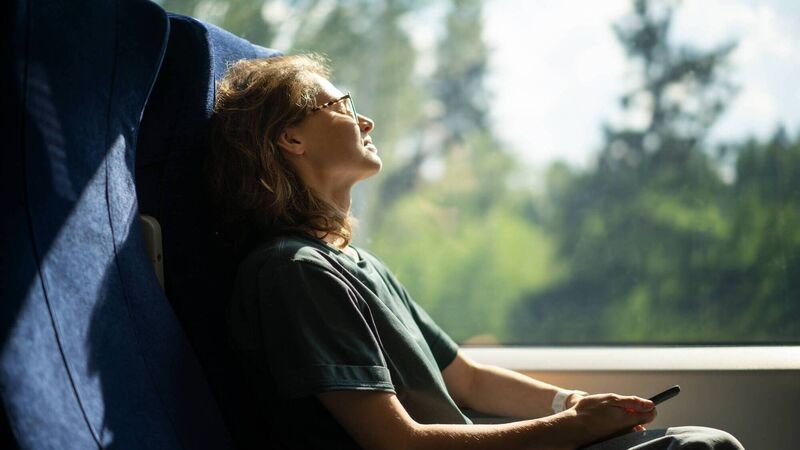Once a pleasant way to travel ... trains are gone ‘off the rails’

A survey by Transport Infrastructure Ireland revealed that 7% of female public transport users in the capital have been sexually harassed and 55% nationally said they would not use it after dark.
I used to love catching the train on long trips like the Cork-Dublin run. It was cosy, comfortable and peaceful in the carriages; during the morning runs, if you were feeling flush, you could stroll on up to the dining carriage and order a delicious and beautifully cooked and presented Irish breakfast. If you didn’t feel like that, there was a trolley with nice stuff to eat and drink.
The staff were pleasant, the passengers read books and newspapers, or chatted with each other; you got to meet some really interesting, articulate, well-read strangers. Or if you felt like being quiet, you just looked out the window.
The whole experience was just lovely. It was relaxing. It was, above all, a thoroughly enjoyable few hours.
Things could get a bit rowdier and more crowded on Friday evenings, All-Ireland weekends or bank holiday weekends, but there was never any unpleasantness.
‘Anti-social’ is an innocuous-seeming phrase which covers a multitude; it can mean anything from rude, violent, lewd, offensive language to lewd, violent, offensive behaviour and, according to a recent report about rail travellers, soiling (oh, God, I thought, when I read about this in a newspaper article, soiling what?). On trains?
The article reported that some 760 incidents in the anti-social category occurred on the country’s rail network between January and June, which works out at about 123 such incidents a month, or over 40 a week.
These included multiple reports of fighting, soiling, sexual harassment, lewd behaviour and hate incidents, many of which involved drugs or alcohol.
Nearly half the 763 incidents took place on DART services in the capital, which seems to be becoming a national byword for stress and trouble. The remainder occurred on Irish Rail’s intercity routes, according to figures released under Freedom of Information laws.
More than 50 incidents since the beginning of the year involved fighting. Fighting. On board a train.
On the more innocuous side, traditional manners and consideration for others have died a death. No longer is it the norm to speak quietly on their phones; nowadays many put their conversations on speaker so everyone else in the carriage has to listen to it.
Many don’t wear ear-buds when they play their favourite music either; their music is played loud so everyone else has to listen to that too. But, as I said, that’s only the most innocuous of the irritations faced by today’s bus and train passengers and staff. Everything is happening - from sexual harassment to verbal assaults, physical assaults, threats of rape against some female staff and passengers who shoot up heroin, snort cocaine off tables, engage in sexual acts and are drunk.
One employee reported how a passenger told her he was “going to ride you like a dirty dog… you’ll be a very sorry girl.” With such threatening behaviour happening in such an overt way on our public transport services, why isn’t there a dedicated police unit on trains and buses to support staff and passengers and put these louts back in their boxes? Why is the government sitting on its hands apparently waiting for something really terrible to happen in front of horrified passengers, like a stabbing or a gang-rape or an aggravated burglary where passengers are threatened by someone holding a knife or a gun? It’s not that they haven’t been warned.
Dermot O Leary, the NBRU’s general secretary, has declared that rail workers are witnessing drug taking, drug dealing, sexual assault and threats of violence. He has warned that train staff are regularly in fear of coming to work. He has stated that rail workers are faced with “constant harassment”.
So, naturally enough, the National Bus and Rail-workers’ Union wants a new Garda unit that’s devoted to patrolling public transport, monitoring CCTV footage and responding to incidents before they get out of hand.
But, incomprehensibly, it looks like the NBRU’s not going to get it.
Garda management has reportedly ruled it out, indicating that it is its belief that “effective local community policing efforts” can meet the policing needs of the rail network.” Em, are they listening to the NBRU at all?
Nor, it seems, is the National Transport Authority which apparently does not support this idea either.
The travellers who it seems are most frequently affected by this disgusting carry-on, are, naturally, women - according to a recent survey by Transport Infrastructure Ireland (TII) called Travelling in a Woman’s Shoes, seven per cent of female public transport users in Dublin have been sexually harassed on public transport, 55% nationally would not use it after dark and 34% say that this fear has sometimes stopped them from going out altogether.
They will not have been reassured by the horrific event in Philadelphia a few weeks ago, when a woman was raped on a transit train.
“You want to draw the least attention to yourself,” one 19-year-old woman told TII researchers.
“I bring a big coat so I can wrap up and hide in it. If you need to run, you don’t want to waste time getting your heels off.”
And when push comes to shove, it seems you can’t expect much help from the bystanders of today.
Alexis Piquero, a criminologist at the University of Miami, explains that there are possible reasons why some crime witnesses do not intervene, such as fear of retaliation by the perpetrator and a belief that someone else will step in and help.
According to Piquero, we need to realise that simply standing there, and even worse, just standing there videoing an assault while expecting someone else to jump in and help, means that “we’re basically washing our hands and absolving ourselves of that responsibility”.
“We need a world where people come together to do the right thing when you see someone being assaulted,” he said.
Do we what.
God knows what’s going to happen before public transport gets the strong, well-equipped, formidable transport police unit it needs to deal with these lowlifes.
But one thing we can be sure of – it’s going to happen.
“Would you consider driving – or even flying?” I asked my friend.
“Why?” she said.







 App?
App?




